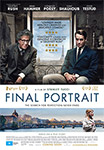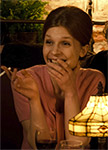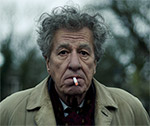Armie Hammer Final Portrait Interview
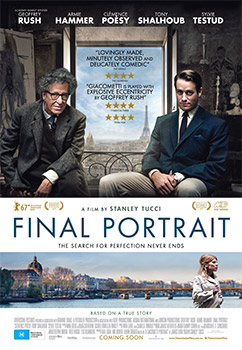
Final Portrait with Armie Hammer
Starring: Geoffrey Rush, Armie Hammer, Clemence Poesy
Director: Stanley Tucci
Writter: Stanley Tucci
Classification: M
Running time: 90 minutes A Final Portrait
Adapted from James Lord's memoir -A Giacometti Portrait'
In 1964, while on a short trip to Paris, the American writer and art-lover James Lord is asked by his friend, the world-renowned artist Alberto Giacometti, to sit for a portrait. The process, Giacometti assures Lord, will take only a few days. Flattered and intrigued, Lord agrees.
So begins not only the story of a touching and offbeat friendship, but, seen through the eyes of Lord, a uniquely revealing insight into the beauty, frustration, profundity and, at times, downright chaos of the artistic process.
FINAL PORTRAIT is a bewitching portrait of a genius, and of a friendship between two men who are utterly different, yet increasingly bonded through a single, ever-evolving act of creativity. It is a film that shines a light on the artistic process itself, by turns exhilarating, exasperating and bewildering, questioning whether the gift of a great artist is a blessing or a curse.
Final Portrait
In Australian cinemas nationally OCTOBER 5, 2017
Interview with Armie Hammer (James Lord) for Final Portrait
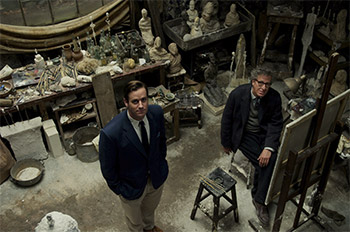 I read the script and I thought it was incredible. I thought it would be great to get to work with Geoffrey Rush, and I heard Tony was also going to be involved, so it seemed like a no brainer. A good portion of this movie is just spent having really interesting conversations about Alberto Giacometti's creative process and the nature of art itself. It's a fun flick!
I read the script and I thought it was incredible. I thought it would be great to get to work with Geoffrey Rush, and I heard Tony was also going to be involved, so it seemed like a no brainer. A good portion of this movie is just spent having really interesting conversations about Alberto Giacometti's creative process and the nature of art itself. It's a fun flick!
The relationship between Alberto and James is very interesting. James is an observer, a writer so he very rarely asserts himself in any situation… he's a little bit like a passive type. He's here because he wants to write about Giacometti and he wants to have a painting of himself by Giacometti. But more than anything, they're friends and he wants to spend time with him and pick his brain and get to know him. The things they talk about in the movie end up going into the biography.
I love Giacometti's work. His sketches are great, his original water colours are great, but his sculptures - there is something magical about them. They're great.
in my research Lord spent more time with Diego than he did actually with Alberto and that's in this script - you see the little side glances, you can see that James and Diego have a very sort of separate emotional life than James has with Alberto, and even that Diego has with Alberto. They make up a side of this trilateral relationship in this movie. It's fun to see all these grown men sometimes acting like children and playing off of each other and trying to irk each other and feeding off each other.
I think Tony Shalhoub is my favourite person in the whole world. Tony has created an internal life for Diego. It's this really kind of compelling thing, watching this still but very deep, emotional life of Diego and you can just tell he's got a history and a past but there's like a mystery to him.
Clémence is fantastic. There's this thing about her, this wonderful joie de vivre. And she's speaking French and then they call cut and she switches to speaking English with a perfect accent. We shot a scene where she came in and didn't say anything, she just stood in the doorway and the look on her face told a thousand different stories and it was great. Apart from being absolutely gorgeous, she's so
talented.
Sylvie Testud is so fun, she's so free and she's so uninhibited, you watch her just live and she is totally un-phased and non-plus-ed by all the negativity that Giacometti might throw at her, she just moves on and does her thing. It's a fun character.
I've always thought the one thing that shines through Stanley's work more than anything else is his intelligence and how quick he seems. And to be directed by someone who is also such an accomplished actor - he knows how to talk to you.
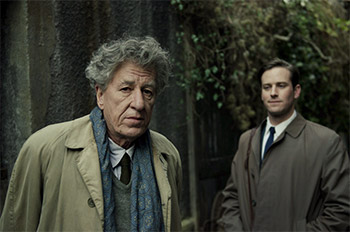 It might just be a part of being an artist, that sort of perpetual dissatisfaction. Because if you did a piece and you were like, wow, it's perfect, it might not be enough impetus to keep you going. It seems like Giacometti views the world entirely differently than all of us. He's trying to create his art in the way that he sees it. He's really the only person who has this sort of prism, looking through the world. He has seen it perfectly in his head and to not be able to make his hands do it, or to not be able to make the final product represent what you see - I can imagine that would be really frustrating. He certainly seems unhappy at times and then at other times he seems to be riding this wave of euphoria and ecstasy with Caroline. And sometimes he has really sweet, tender moments with his wife, and then he doesn't want to see anybody and he wants to burn the whole world down. It's part and parcel of his personality.
It might just be a part of being an artist, that sort of perpetual dissatisfaction. Because if you did a piece and you were like, wow, it's perfect, it might not be enough impetus to keep you going. It seems like Giacometti views the world entirely differently than all of us. He's trying to create his art in the way that he sees it. He's really the only person who has this sort of prism, looking through the world. He has seen it perfectly in his head and to not be able to make his hands do it, or to not be able to make the final product represent what you see - I can imagine that would be really frustrating. He certainly seems unhappy at times and then at other times he seems to be riding this wave of euphoria and ecstasy with Caroline. And sometimes he has really sweet, tender moments with his wife, and then he doesn't want to see anybody and he wants to burn the whole world down. It's part and parcel of his personality.
I think there is a lot in this film for everybody. People who just want to go and watch a fun interesting movie will get that. Art students who love Giacometti will get an insight that they have probably never seen before. Everyone is making an incredible, nuanced, layered movie and I think that's part of what makes it so special.
Final Portrait
In Australian cinemas nationally OCTOBER 5, 2017
Have You Seen This?
MORE
- Mission: Impossible Fallout
- Glenn Close The Wife
- Allison Chhorn Stanley's Mouth Interview
- Benicio Del Toro Sicario: Day of the Soldado
- Dame Judi Dench Tea With The Dames
- Sandra Bullock Ocean's 8
- Chris Pratt Jurassic World: Fallen Kingdom
- Claudia Sangiorgi Dalimore and Michelle Grace...
- Rachel McAdams Disobedience Interview
- Sebastián Lelio and Alessandro Nivola...
- Perri Cummings Trench Interview

